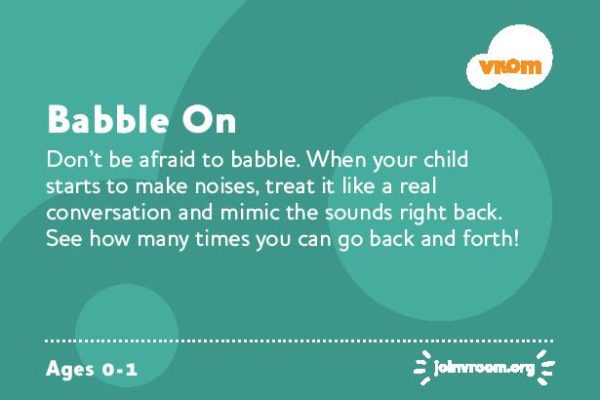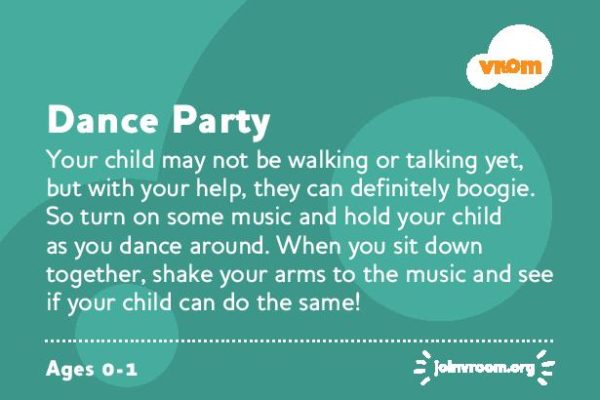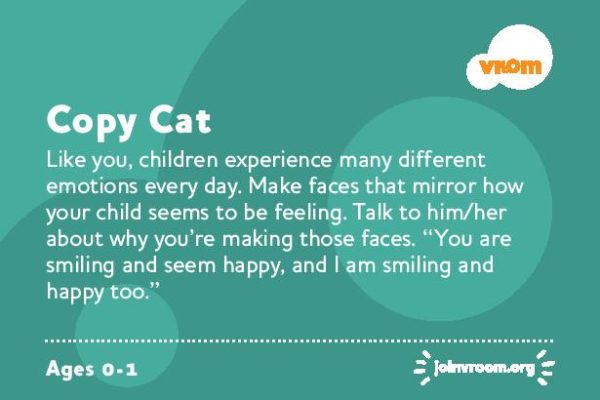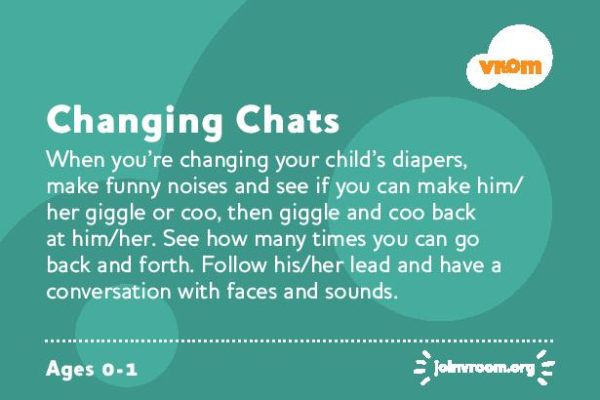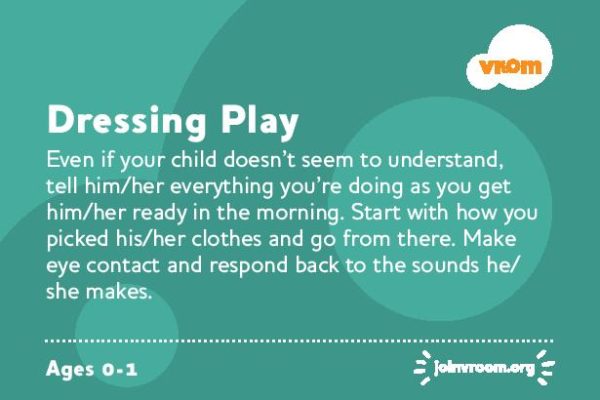OVERVIEW
The first year of life encompasses the most important period of brain development and growth for your child and builds a foundation for future learning. You are key to that important growth! Babies’ brains develop through human interaction – just like a game of tennis. You’ll want to engage with your child (serve) and then wait for your baby to respond (return the ball).
Want to know more about what to expect as your infant grows? Click here to learn more about important milestones during this time.
Remember that all children develop differently. This means that your child may be really good at some activities and struggle with others. This is normal. Don’t worry! The information on this website is meant to be a guide, not a checklist of things which have to be mastered.
PARENT EXPERIENCE
Parenting is hard! Don’t be ashamed to ask for help when you need it. Create a list of friends, families or neighbors you can call when you are feeling over-tired, frustrated or in an emergency.
Pregnancy and the months that follow can be both an exciting and a stressful time. Sometimes mothers also get the “baby blues” or feel depressed after their baby is born. Read more about these feelings. Keep in mind that fathers can have feelings too. Learn more at www.postpartum.net or text TALK to 38255
Never shake your baby. If you are very frustrated, put your baby somewhere safe and walk away to calm yourself down. You can talk to someone at the Fussy Baby Network at 1-877-627-9227 or fussybabynetworkcolorado@gmail.com.
Having a consistent caregiver is also an important aspect of raising a healthy infant. Learn more about continuity of care.
HEALTH AND ACTIVITY
Safety: If you didn’t have the opportunity to start childproofing during your pregnancy, there’s no time to lose! Your baby will be up and around before you know it. Click here for tips on childproofing your home.
Check for choking hazards. Babies explore everything with their mouths. Anything that fits inside a toilet paper tube is too small. Keep the poison control number near your phone – 1-800-222-1222. If you need it, you will need it very quickly.
Bath time can be a special time for baby and caregiver, but never leave your child alone in the water – even for a second.
It is also important to create a safe sleeping environment for your child. Always put your child to sleep in a safe place, and lay your baby on his or her back. Learn more about sleep safety.
Safety isn’t just limited to your home – keep in mind the importance of keeping your baby safe when you’re outside the house as well. Be sure to protect your infant from the sun. Click here for tips on sun protection.
Ensure that you’re using your car seat correctly as well – it must be property installed to be effective. Click here for more information on car seat safety and remember to never leave your baby in the car alone. For more information about car safety, click here.
Nutrition: Ask your child’s doctor about the benefits of breastfeeding and how to get started. Find when to start foods other than breast milk or formula. The transition to solid foods is an important part of your baby’s nutrition, so be sure that you’re feeding him or her healthy foods. However, be aware that small children can choke easily on some foods. Learn more.
Looking for assistance to afford healthy foods for you and your baby? Click here to learn more about resources that might be available to you.
Overall Health: Well baby checks are an important component of having a healthy infant, but don’t forget the dentist! Gums and teeth are being formed at this early age. The American Dental Association recommends that the first visit to the dentist should happen within six months of a tooth.
Be sure that your child is up-to-date with his or her immunizations as well. Need help finding a doctor? Click here to find a pediatrician near you.
FEELINGS AND BEHAVIOR
Communication: Babies communicate their feelings through smiling, crying and body language. Get to know the signs your baby makes when he or she is tired, hungry, wants to play or needs something. Ask your baby if he or she is ready for a new activity. Wait for the answer – smiling and wiggling can mean yes, while stiffening can mean no.
Looking away is another way that your baby communicates. If he or she is no longer engaging with you, it may be time for a break. Remember the game of tennis – you want to serve to your child and then wait for the return.
Routine: Developing a routine with your child can make things easier for everyone. Help your baby go to sleep by having a sleep time routine. Babies really like to have the same things happen regularly such as singing the same song or sleeping in the same place.
Trust: Hold your baby when he or she wants to be held. This helps learn trust and does not spoil the child. Play peek-a-boo with your baby. This introduces your child to the idea that when you leave, you will always come back.
Separation anxiety can start to develop at around seven months. Learn more what to do when your child gets upset when you leave.
LANGUAGE AND LEARNING
Reading: Start reading to your child even before he or she is born. Libraries have dozens of free resources that can help you start your child off right. Click here to see a list of libraries in Larimer County.
Board books are a good way to show your baby how the process of reading a book works. It’s never too early to start enforcing strong literacy skills!
Talking with Your Baby: Ask yourself “how many words am I using around my baby?” When children are talked to and hear lots of words, their brains grow so it’s easier for them to learn. Keep in mind, hearing language on a video is NOT the same as hearing spoken words. Speaking, singing and interacting with your child is essential.
Talk with your baby about what you’re going to do – children like to know what’s happening. Babies also like to be carried and hearing words that describe the things around them. Talk about the red ball or your favorite chair.
Explore language and sound with your baby. Repeat your baby’s sounds and have back-and-forth conversations.
Screen Time: Babies love to watch faces. Ensure that you have face-to-face time with your child – phone free! In the same way that you will continue to monitor your child’s screen time as he or she gets older, be aware of your own time with technology and model limited use for your child. Your baby wants to do what you do! Learn more about the American Academy of Pediatrics Recommendations for Children’s Media Use.

